
Do I Really Need a Travel Insurance?
Please contact us and we will help you to organize your trip! It's free and without commitment.
- Read the post
- Details
- Advices
Presentation.
- 1What Are the Risks in New Zealand?
- 2How to Choose a Good Insurance?
- 3Do You Need a Special Insurance to Drive?
- 4How to React in the Event of Accident?
- 5Which Insurance Company for a New Zealand Travel?
- 6Insurance and Budget Required for a WHV.
What Are the Risks in New Zealand?

New Zealand is a wild country, but without real dangers.
The islands of New Zealand do not present any health risks and there are no species dangerous to humans. No vaccine is required to visit the country (it depends, however, of the country you originate from, please double-check on this page) and the level of criminality is one of the lowest in the world. In such circumstances, it is legitimate to ask whether to invest in travel insurance or not?
If it remains optional in the framework of a brief tourist stay, multi-risk insurance is nevertheless a compulsory condition to apply for a Working Holiday Visa. The certificate issued by your insurer will be checked at your arrival in New Zealand.
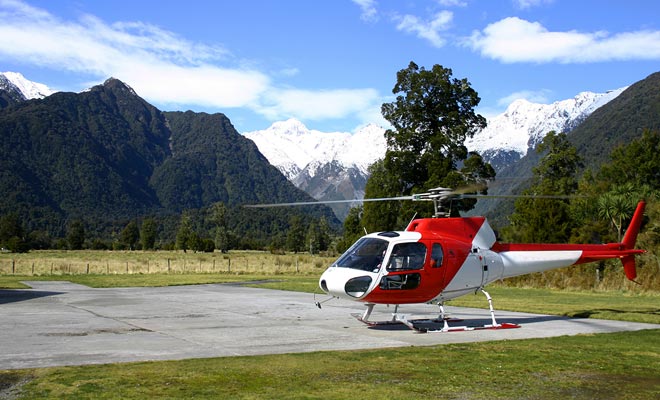
The poorly prepared hikes mobilize the rescuers.
I do not wish to dramatize, but it should not be forgotten that a one-year stay in a foreign country exposes you to many risks.
For if the cost of a doctor's consultation is not excessive, hospital care and repatriation can leave you broke, with debt for life in the worst case.
You do not waste your money by taking out travel insurance.
You actually pay the price of your tranquility and reassure your family and friends at the same time. Honestly, there is no need to argue (the insurance is mandatory for a Working Holiday Visa anyway), I propose instead to help you choose an appropriate formula.

All activities are not covered by your insurance.
A good insurance is not necessarily the cheapest, but the one that effectively covers the activities of the stay.
Rest assured, affordable solutions exist and the issue of insurance will not prevent you from getting your Working Holiday Visa.
How to Choose a Good Insurance?

Credit card insurance is only valid for three months.
Unless you have taken out a specific contract, you can already forget the insurance of your credit card. For a trip that multiplies journeys on the road, small jobs or sports activities, you need a real multi-risk travel insurance.
In any case, a Working Holiday Visa imposes an insurance covering yourself in any situation and during an entire year.
Unless you have taken out a specific contract, you can already forget the insurance of your credit card. For a trip that multiplies journeys on the road, small jobs or sports activities, you need a real multi-risk travel insurance.
The first step to select the appropriate insurance is to verify that it can pay for any care you might need in New Zealand. Otherwise, you may find yourself stuck by a lack of money on your bank account.
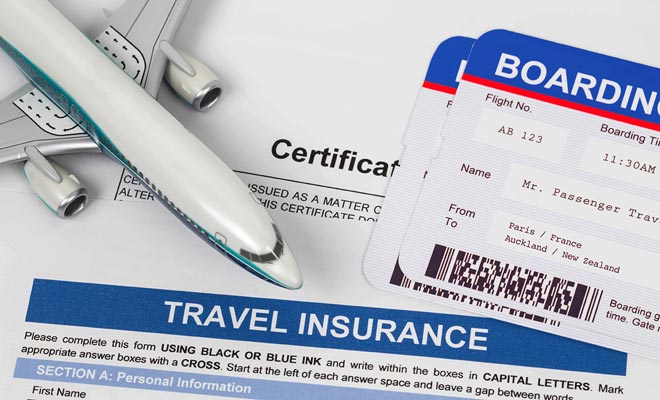
The insurance is to be subscribed before departure in WHV.
Then look at the nature of the risks covered, the repayment ceilings and the amount of deductibles.
Review the fine print of the contracts and you will discover that the insurance does not cover the illnesses prior to the departure: do not hope to complete in New Zealand a dental care started in your country.
Without going so far as to imagine improbable scenarios, let's consider nevertheless the possibility of an emergency repatriation. If it takes place only at the last extremity, when the care on the spot is impossible or far too expensive, the sums committed for the plane return are already enough to justify an integral coverage!
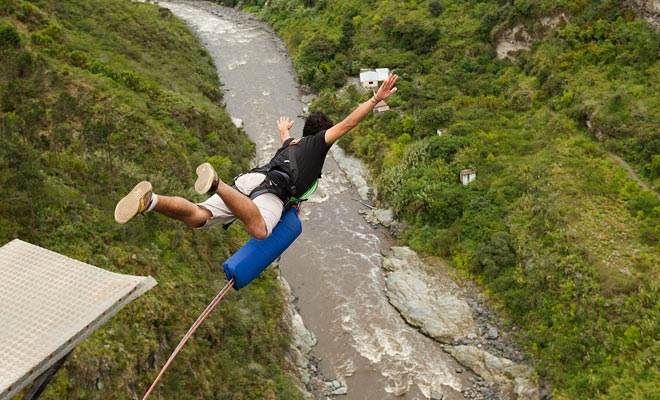
Most extreme sports are not covered by insurance.
Of course, insurers do not like extreme sports such as bungee jumping in Queenstown.
This type of activity is high on the list of exclusion clauses. Classic sports such as cycling are usually covered, but take the time to study the issue seriously before you commit. Multi-risk insurance is not “all-risk” insurance. Depending on the nature of your stay in Working Holiday Visa, there are other types of insurancesr (for the vehicle you plan to buy for example).
Do You Need a Special Insurance to Drive?
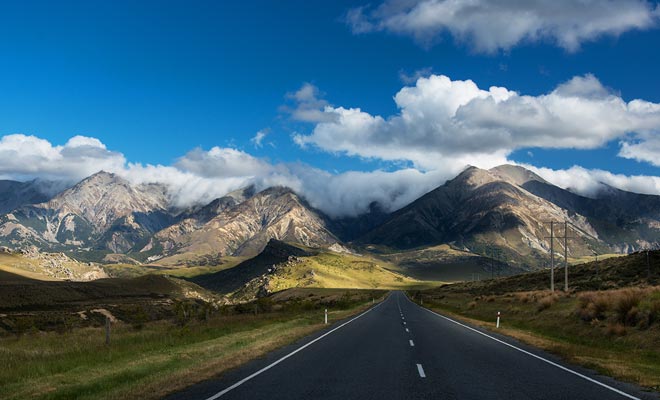
New Zealand has a very original insurance system.
The driver's insurance you have in your country is not valid in New Zealand. Is it necessary, however, to subscribe an additional insurance for the rental or the purchase of a vehicle during your stay in Working Holiday Visa?
Renting a car, a small van or a camper always includes a basic insurance, but it does not necessarily cover all the damage that the vehicle could suffer.
Tires, for example, are generally not covered. A flat tire will remain at your expense, just like broken glass (a frequent problem in a country where there are many gravel roads).
Under these conditions, it is advisable to redeem part of the franchise of the vehicle to travel with the free spirit.
For those who do not know, deductible is the sum that remains your responsibility after the insurance paid a part of the damage.
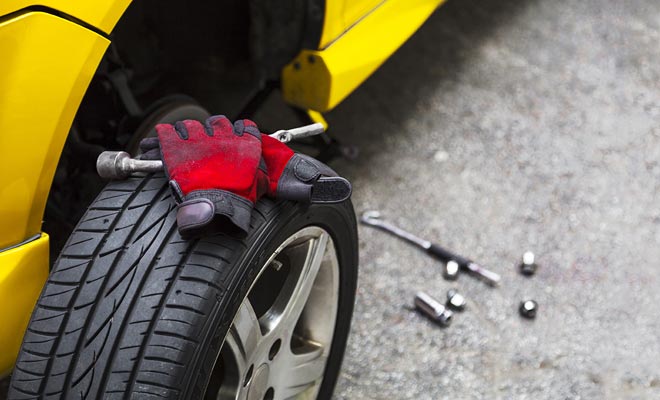
Tires are not often covered by insurance.
It is generally forgotten that the rented vehicle is not necessarily designed for all types of land.
Some roads are reserved for four-wheel drive vehicles. If you do not comply with these conditions, you will not be covered in case of accident. Think about it twice before driving with your motorhome on the 90-mile beach!
To the extent that the rental of a vehicle is not profitable over a long stay, many young traveling with a Working Holiday Visa prefer to buy an old vehicle.
If you choose this solution, the vehicle insurance will be mandatory.
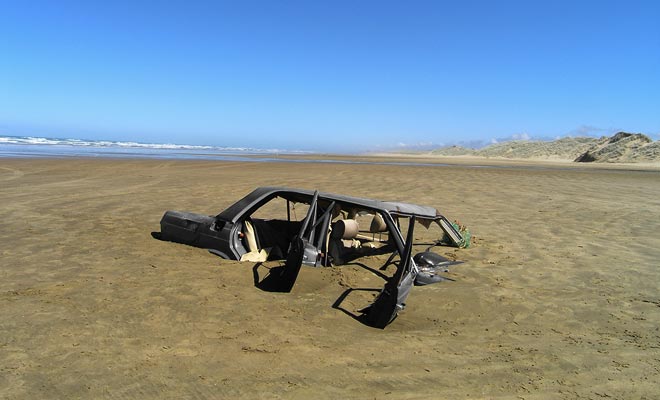
Think twice before driving on the beach ...
As unbelievable as it may seem, driver insurance will be optional, as New Zealand law prohibits claims in the event of accident, including if serious injury or property damages happen.
In return, the ACC (Accident Compensation Corporation) will compensate you even if you are foreign to the country. Physical and psychological therapies will be fully refunded.
Please note that the ACC can also compensate you if a work stoppage results from your accident (of course we are talking here about a New Zealand job, not in your own country).
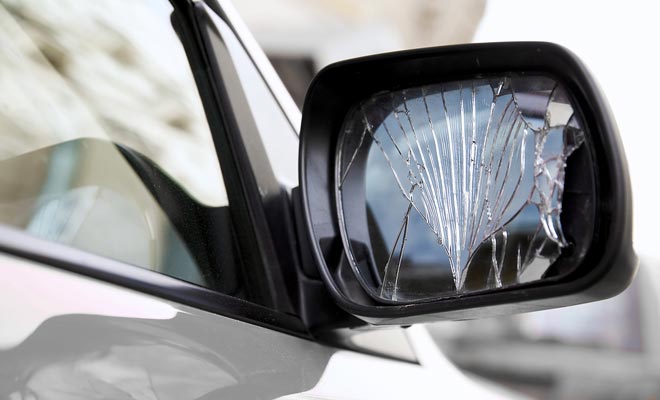
Car glass insurance is usually offered as an option.
Remember, however, that the ACC is not a health insurance. It only covers accidents and does not replace a real travel insurance.
It is also necessary that the so-called accident be recognized as such, which excludes driving under the influence of alcohol or narcotics. Having said that, I will size this opportunity to say a word about how to behave in the event of an accident.
How to React in the Event of Accident?

The weather can change in just a few minutes in New Zealand.
It is not strictly speaking a very pleasant subject, but you must know in advance the behavior to adopt in case of accident. In New Zealand, it is especially the hikes and swimming activities that request to the intervention of the rescuers.
However, the risks on the road are not to be underestimated in a country where people drive on the left side (if you are not already used to do it in your own country). The driving speed is limited to 100 km / h, which may seem slow but is already sufficient to cause serious accidents.
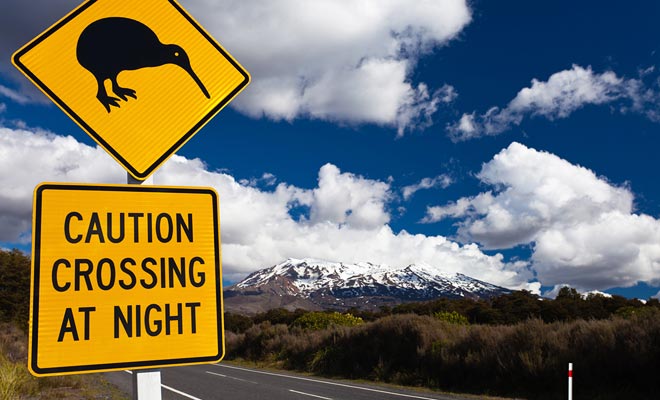
On the road, beware of kiwis, penguins and sheep ...
Keep a list of emergency numbers and your insurance certificate in your pocket. In the event of an accident, keep your calm, do the necessary, and call an emergency number if you can, or seek for help.
Do I need to recall that a hit-and-run is a serious crime, especially in New Zealand? If you damage (even slightly) another vehicle, you must notify the owner within 48 hours.
Otherwise, you will incur a fine, and you also lose the right to any compensation from your insurance.
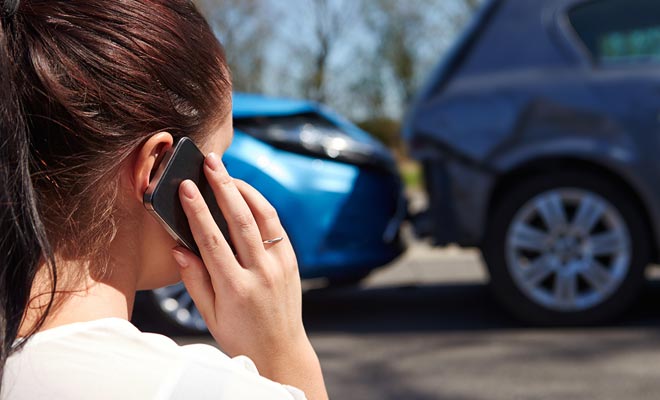
In the event of an accident, you will be covered by the ACC.
To activate the insurance, note the names and addresses of the people involved, and the number plates if it is a road accident.
Collecting testimonials, ideally signed by a police officer, is highly advised.
On the other hand, do not assume responsibility for what happened!
Keep a neutral tone, do not accuse anyone, and forward the elements to the insurance company that will handle the case and the claim to the ACC.
Which Insurance Company for a New Zealand Travel?
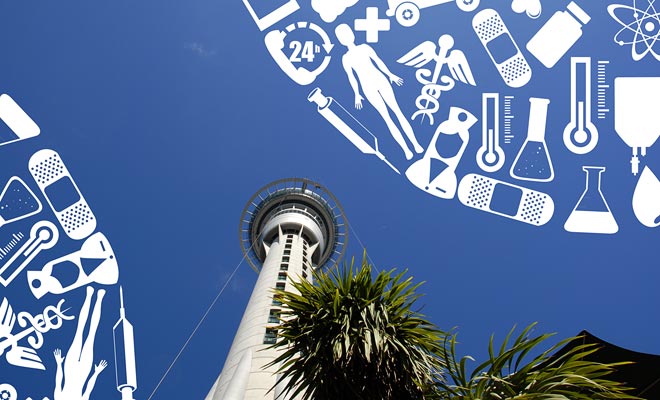
Kiwipal recommends Chapka's insurances.
I imagine you are hoping for recommendations on insurance companies. Of course, reading my advice does not absolve you from conducting your own comparative study online.
I have chosen to recommend Chapka Insurances in complete independence. The various offers from this insurer range from simple cancellation insurance to multi-risk solutions perfect for a Working Holiday Visa.
The price / quality ratio is one of the most advantageous (if not the best) of the market.
You will pay approximately $50 per month ($600 per year) to be covered seriously.

Students can sometimes extend the coverage of their insurance.
If you consider the amount too high, remember that you would have spent almost the same for the Internet subscription that you will shut down anyway before you leave.
Which brings me to underline the fact that you must imperatively subscribe an insurance BEFORE your departure to New Zealand.
If you are still studying (or going to New Zealand to take a course), it may be more interesting to ask your care insurer to extend your coverage to the whole world. You will have to pay an extra, but you will avoid multiple opening and closing of accounts..
Finally, if you wish to have a vehicle insured, I refer you to our complete guide about the means of transport suitable for a Working Holiday Visa.
The subject is serious enough not to be overlooked here, and I prefer to conclude this article about insurance with some practical advice.
Insurance and Budget Required for a WHV.
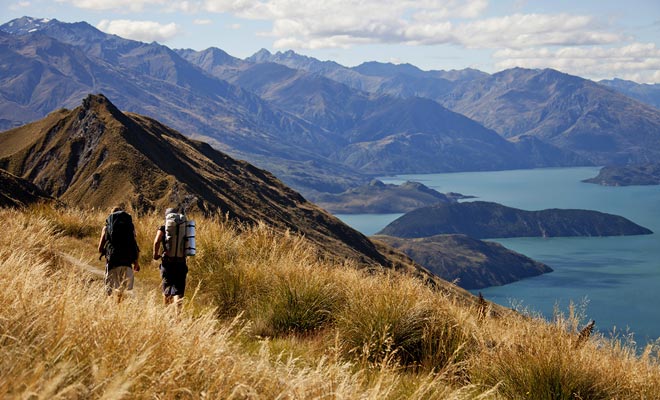
Multi-risk passenger insurance is compulsory for a WHV.
At the risk of repeating myself, I insist that you read your insurance contract down to the last detail. A boring reading for sure, yet absolutely indispensable. Because not knowing how you are covered is almost as risky as traveling without insurance at all.
Regarding your budget, a good multi-risk insurance will allow you to be covered for only one euro per day for one year! If you need medication, it will be sufficient to present your insurance card in order to not pay a single penny in most cases. At worst, you will settle the deductible without compromising the rest of your stay.

Small hassles can occur during a Working Holiday Visa year.
If you are still not convinced, I suggest you list your health expenses during the past year.
There is a good chance that you will find at least one visit to the dentist or doctor ... So, why would it be otherwise during a one-year stay when you will be even more active and exposed to accidents than usual?
Especially because the medical expenses in New Zealand are quite high:
| MEDICAL CONSULTATION | AVERAGE RATE |
|---|---|
| General practitioner | $65 |
| Dentist | $110 |
| Specialist | $200 |
Before leaving, be sure to bring along your insurance certificate, including the full contract to be able to consult it on site if needed.
Also take your health journal and add the list of New Zealand emergency numbers in your mobile contact application.
Do not forget to bring your medications (the prescription is also needed).
The full guide section about the Working Holiday Visa presented on Kiwipal includes everything you need to know to plan a one-year trip! A reading to be completed with our list of the must-do activities in New Zealand. But this is another subject, and I leave you in company of our friend Ben the Kiwi to extend the debate on insurance in his rubric of practical advice.


Questions & Answers.

What can I do for you? I think you have understood that a good insurance is essential. I would not argue about that, but you can ask me your questions, I will answer your pleasure!
- All topics ... 21 answers in total
- Health and Care 10 answers
- Insurance 8 answers
- Emergency Services 3 answers
Health and Care
- Can I use my own medical care?
You should not keep your own mutual, because it will not cover you in New Zealand. This would mean paying two insurances instead of one. Unless, of course, your mutual company agrees to extend its coverage abroad? Rather than cancel your contract, it is also possible that your mutual insurance company offers you a suspension of subscription during your trip.
- Is medical care expensive?
Cares are often more expensive than in Europe, especially regarding dental care.
- Where to buy medication in New Zealand?
Analgesics and other non-prescription drugs are available at pharmacies. As in Europe, you need a medical prescription to buy antibiotics.
- Am I Covered by default during my stay?
Your own medical care insurance does not cover you in New Zealand. Sometimes you read on the Internet that you can be reimbursed for purchases of drugs during a short stay, but it is an urban legend.
- Am I covered by the New Zealand health system?
The New Zealand health system is for people who have been living in the country for at least two years. With a Work Holiday Visa, you are not affected by this.
- How do I consult a specialist?
The New Zealand health system works with a referral system. You must see a generalist doctor prior to call a specialist.
- Who pays for hospitalization?
The Health Funding Authority will pay in advances the cost of hospitalization.
- Does New Zealand have a health risk?
New Zealand is not experiencing epidemics in its territory.
- Are there compulsory vaccines?
No vaccine is mandatory, but WHO recommends standard vaccinations such as mumps, chickenpox or hepatitis B vaccines ... you may have already done these vaccines (check on your health record).
- Should snake bites to be feared?
There are no snakes in New Zealand!
Insurance
- Is passenger insurance mandatory?
Optional, but strongly recommended in the context of a brief tourist stay, passenger insurance is compulsory to obtain a Working Holiday Visa.
- Which organization compensates in case of an accident?
The Accident Compensation Corporation (ACC) is a state agency that compensates victims of accidents, regardless of their nationality. Provided, of course, that this we are talking of an accident and that the persons concerned were allowed to circulate in the country.
- Not being a resident, am-I concerned by the ACC?
The ACC compensates any person in New Zealand as long as they have the right to be in the country. This is the case for visitors staying less than three months or anyone with a New Zealand visa (notably the Working Holiday Visa).
- Can I trust for my credit card insurance?
This is possible within the 90-day limit. Ensure that your travel insurance includes repatriation and then check the nature of care covered during a stay abroad.
- What are the deadlines to be reimbursed by my insurer?
Reimbursement periods are included in your insurance policy. Ideally, an insurance policy that advances the expenses on the simple presentation of an attestation.
- Does my insurance cover sports activities?
All insurance does not cover sports activities. Most insurances exclude high-risk or extreme sports, which correspond to a wide range of possibilities ranging from paragliding to bungee jumping. The choice of insurance depends on the activities you plan to do in New Zealand.
- Is my French car insurance sufficient?
You can check with your insurer for an extension of insurance abroad. Except surprise, you are not covered by default.
- Should you buy the franchise of the rented car?
Insurance does not cover tire or windshield damages. Yet these are accidents that can happen even if you are an excellent driver. Buying the deductible reduces, if not eliminate, the expenses remaining at your charge in case of accidents.
Emergency Services
- Where can I find the list of emergency numbers?
Emergency numbers are on the first page of the Yellow Pages directory. They are also displayed in public cabins. But it is better to note them on Kiwipal or add them in the directory of your mobile phone.
- Are there any emergency numbers?
There are nurseries in hospital. If you're just asking for practical advice, you can also check out drugstores.
- Is there a number to call for medical advice?
The Heathline line is available at 0800 611 116. Attention, this toll-free number does not put you in touch with a doctor. It is mainly a service of practical advice, guidance or contact with hospital services.





